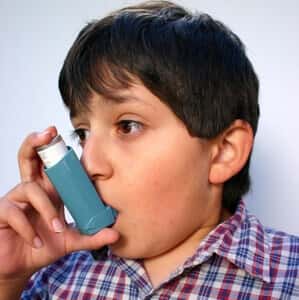
For most of the 20th century, pediatricians and parents preferred aspirin for lowering fevers and easing pain in children. But in 1980 a report linked aspirin to Reye syndrome, a rare but potentially fatal childhood disease.
Initially, doctors were skeptical. One neurologist maintained that Reye syndrome following aspirin administration was as “rare as poop under a hobby horse.”
He was proved wrong, however. Although aspirin manufacturers resisted adding a warning, the evidence became strong enough that the FDA required a change to the label in 1986. In the six years between the initial report and the official warning, hundreds of children got sick with Reye syndrome. No one knows how many died.
A Switch to Acetaminophen (Tylenol):
Once parents learned that aspirin could be risky for young children with chickenpox or the flu, they switched to something they thought would be much safer. Acetaminophen (Tylenol) became the drug of choice to lower a child’s fever.
Asthma Incidence Has Been Climbing:
Ever since then, the rate of childhood asthma has been rising. In 2008, a study published in The Lancet (Sept. 20) reviewed data on more than 205,000 youngsters in 31 countries. The data were collected as part of the International Study of Asthma and Allergies in Childhood (ISAAC) and revealed an association between administration of acetaminophen during infancy and development of asthma by age six or seven. Those who were given the pain reliever as often as once a month had triple the background risk of developing allergy-related wheezing. (This analysis also found a link to nasal allergies and eczema.)
Acetaminophen Use and the Risk of Asthma:
A meta-analysis the following year offered support for this hypothesis (Chest, Nov., 2009). In the 19 trials that were reviewed, 425,000 children had been studied. The authors concluded that: “The results of our review are consistent with an increase in the risk of asthma and wheezing in both children and adults exposed to acetaminophen.”
Another study suggested that acetaminophen may be contributing to wheezing and the risk of asthma in children and adolescents. This epidemiological research might encourage pediatricians and parents to be more cautious in using this common painkiller and fever reducer (Beasley et al, American Journal of Respiratory and Critical Care Medicine, Jan. 15, 2011).
An article in the journal Pediatrics (Dec. 1, 2011) took a stronger position. John McBride, MD, is a pediatric pulmonologist who declared, “Considering currently available data, I now recommend that any child with asthma or a family history of asthma avoid using acetaminophen.” He was concerned that acetaminophen use would significantly increase the risk of asthma.
Should Pregnant Women Avoid Acetaminophen?
Such a precaution might also apply to pregnant women. Researchers in New Zealand, where acetaminophen is called paracetamol, analyzed data from six studies (Clinical and Experimental Allergy, April, 2011). The investigators concluded: “The use of paracetamol during pregnancy is associated with an increased risk of childhood asthma.”
Avoiding a Warning Lag:
Obviously, some pediatricians and allergists still feel that there is not yet enough data to justify a prohibition. Dr. McBride disagrees. In 2011 he told The New York Times: “If studies prove that acetaminophen makes asthma worse, I can’t imagine telling my patients that I knew about this five years ago, but I wasn’t sure so I didn’t mention it.”
Since the connection between aspirin and Reye syndrome was first reported in 1980 and parents were not notified through label warnings until 1986, his estimate of the time frame doesn’t seem exaggerated. It makes sense to alert parents to the possible dangers of acetaminophen now, so they can use this drug only when it is truly warranted.
An analysis of epidemiological data concluded, “The only environmental factor that has launched a large and consistent epidemiological signal, found in almost every epidemiological study addressing the issue, is previous acetaminophen exposure, which consistently increases the prevalence and clinical manifestations of every wheezing disorder under study” (Martinez-Gimeno and Garcia-Marcos, Expert Review of Respiratory Medicine, April, 2013).
More recently, however, experts concluded that the evidence on acetaminophen use during pregnancy and the risk of asthma in the offspring is insufficient to recommend changes in practice (Rosas-Salazar and Hartert, Current Opinion in Allergy and Clinical Immunology, Jan. 11, 2017).
Revised 2/18/2017

